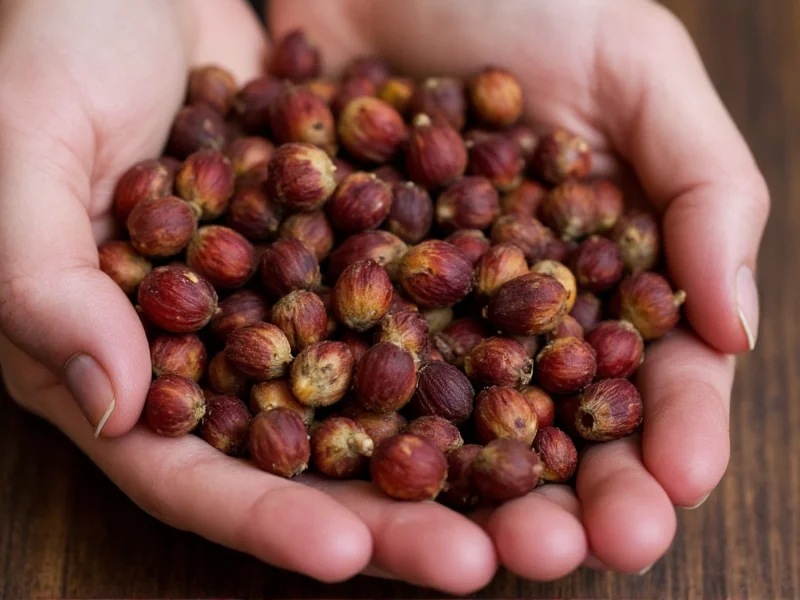Culinary Applications of Cloves
Cloves bring distinctive warmth to both sweet and savory preparations. Their intense flavor means a little goes a long way in cooking. Whole cloves work best for slow-cooked dishes where they can be easily removed after infusion, while ground cloves integrate smoothly into baked goods.
Professional chefs recommend using whole cloves in uses of cloves in cooking like pickling solutions, where they impart flavor without creating sediment. For holiday baking, combine ground cloves with cinnamon and nutmeg in a 1:2:1 ratio to create balanced spice blends. When making chai tea, add two whole cloves per cup along with cardamom and ginger for authentic flavor.
| Culinary Application | Recommended Quantity | Best Paired With |
|---|---|---|
| Pumpkin pie filling | 1/4 teaspoon ground | Cinnamon, ginger, nutmeg |
| Beef stew | 3 whole cloves | Bay leaves, thyme, peppercorns |
| Mulled wine | 5 whole cloves per bottle | Orange peel, cinnamon sticks, star anise |
| Fruit preserves | 2 whole cloves per pint | Lemon zest, vanilla bean |
Medicinal Applications with Scientific Basis
Eugenol, comprising 70-90% of clove essential oil, demonstrates documented antimicrobial and analgesic properties. Research published in the Journal of Dentistry confirms clove oil's effectiveness for temporary toothache relief, making how to use cloves for toothache a common search query.
For safe application, dilute one drop of clove oil with one teaspoon of carrier oil before applying to affected areas. Never apply undiluted clove oil directly to gums or skin. While cloves show promise in laboratory studies for blood sugar management, human trials remain limited. Always consult healthcare providers before using cloves for medicinal purposes, especially if taking anticoagulants or managing chronic conditions.
Household and Practical Applications
Household enthusiasts increasingly explore natural household uses of cloves as chemical-free alternatives. Inserting whole cloves into citrus fruits creates attractive, long-lasting air fresheners that naturally repel fruit flies. Place these pomanders in kitchen areas or near trash cans for odor control.
Cloves' antimicrobial properties make them valuable for food preservation. Add whole cloves to vinegar-based cleaning solutions for enhanced disinfecting power. Their strong scent deters pantry pests—store cloves with grains and legumes to prevent weevil infestations. For a natural moth repellent, place whole cloves in small muslin bags within clothing storage areas.
Beauty and Personal Care Uses
Traditional beauty uses of cloves leverage their antiseptic qualities. Create a gentle exfoliating scrub by combining ground cloves with honey and yogurt. The mild abrasiveness helps remove dead skin cells while providing antioxidant benefits.
For oral health maintenance, dilute clove oil in water for an antimicrobial mouth rinse. Use one drop of oil per cup of warm water, swishing for 30 seconds before spitting out. This practice supports gum health between dental visits but doesn't replace professional care. Avoid prolonged use as excessive application may cause tissue irritation.
Storage and Selection Guidelines
Maximize shelf life by selecting plump, dark brown cloves with visible oil glands. Properly stored whole cloves maintain potency for 1-2 years when kept in airtight containers away from light and moisture. Ground cloves lose flavor more quickly—use within 6 months for best results.
Test clove freshness by pressing a bud between your fingers; quality cloves should release aromatic oil. Store near bay leaves and allspice for convenient access when preparing spice blends. For long-term storage, freeze whole cloves in vacuum-sealed bags to preserve volatile compounds.
Safety Considerations
While generally safe in culinary amounts, concentrated clove applications require caution. The FDA recognizes cloves as GRAS (Generally Recognized As Safe) for food use, but medicinal applications carry risks. Excessive clove oil consumption may cause liver damage, particularly in children.
Discontinue use if experiencing mouth numbness, soreness, or bleeding gums. Pregnant women should avoid medicinal clove applications due to potential uterine stimulation effects. Always perform patch tests before applying clove products to skin, as some individuals develop contact dermatitis.
What are the most common culinary uses of cloves?
Cloves enhance both sweet and savory dishes. Common culinary applications include spicing holiday baked goods like gingerbread and pumpkin pie, flavoring mulled wines and ciders, adding depth to meat marinades, and preserving fruits in jams and pickles. Whole cloves work best for slow-cooked dishes where they can be removed after infusion, while ground cloves integrate smoothly into baked goods.
Can cloves really help with toothaches?
Yes, clove oil provides temporary toothache relief due to its eugenol content, which has natural anesthetic and antimicrobial properties. Research confirms its effectiveness for short-term pain management. For safe application, dilute one drop of clove oil with one teaspoon of carrier oil before applying to the affected area. Never use undiluted clove oil directly on gums, and consult a dentist for persistent pain.
How should I store cloves to maintain freshness?
Store whole cloves in an airtight container away from light and moisture to maintain potency for 1-2 years. Ground cloves lose flavor more quickly and should be used within 6 months. Test freshness by pressing a bud between your fingers—if it releases aromatic oil, it's still potent. For extended storage, freeze whole cloves in vacuum-sealed bags to preserve volatile compounds.
Are there any safety concerns with using cloves medicinally?
Yes, while safe in culinary amounts, concentrated clove applications require caution. Excessive clove oil consumption may cause liver damage, particularly in children. Discontinue use if experiencing mouth numbness, soreness, or bleeding gums. Pregnant women should avoid medicinal clove applications due to potential uterine stimulation effects. Always dilute clove oil properly and perform patch tests before skin application.
What are some natural household uses for cloves?
Cloves serve multiple natural household purposes. Insert whole cloves into citrus fruits to create attractive air fresheners that repel fruit flies. Add cloves to vinegar-based cleaning solutions for enhanced disinfecting power. Store cloves with grains and legumes to prevent weevil infestations, and place them in small muslin bags within clothing storage areas as a natural moth repellent.











 浙公网安备
33010002000092号
浙公网安备
33010002000092号 浙B2-20120091-4
浙B2-20120091-4